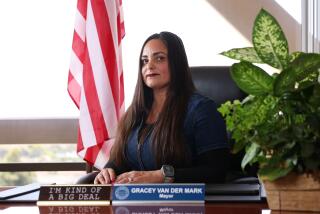State Asks Governor’s Calendar Be Kept Private : Legal system: The Supreme Court is urged to overturn a lower court ruling that would let reporters see list of daily appointments.
- Share via
The California Supreme Court, weighing the legal limits of the public’s right to know, was asked Tuesday to deny news reporters access to the governor’s daily appointment calendars and the names of those he consults on official business.
A state attorney urged the justices to overturn an appellate court ruling that would permit the Los Angeles Times to see the daily schedules of former Gov. George Deukmejian after a judge removed any material that could endanger the governor’s security.
Release of the calendars would interfere with the governor’s need to confer privately with people and obtain their candid advice, thus inhibiting the decision-making process, state Deputy Atty. Gen. Ted W. Prim told the justices in a hearing in Los Angeles.
If such disclosure were required, people who met with the governor would be subject to “never-ending interrogation and cross-examination” about what was discussed, Prim said. The next demand, he warned, would be for the governor’s telephone records.
Rex S. Heinke of Los Angeles, an attorney for the newspaper, replied that disclosure was required as a valid means of reducing secrecy in government.
“We’re interested in who the governor meets with,” Heinke said. “Is it the NAACP? Is it the California Chamber of Commerce? Is is the Ku Klux Klan? Is it the people he used to practice law with in Long Beach?” (Deukmejian and Chief Justice Malcolm M. Lucas were once law partners).
“We’re not asking for information on his personal activities . . . but on who he meets while conducting public business,” Heinke said.
Although Deukmejian left office in January, the court’s decision--due within 90 days--could affect not only access to the former governor’s appointment records but also similar data kept by Gov. Pete Wilson and other public officials.
At issue in the case are the requirements of the state Public Records Act, enacted in 1968 and modeled after the federal Freedom of Information Act. Under state law, official data generally must be disclosed to the public--but some records are exempt, such as correspondence to and from the governor. Official agencies also can refuse to reveal information when they can show it would not be in the public interest.
The dispute before the court arose in 1988 when a Times reporter sought access to Deukmejian’s daily schedules dating to his inauguration in 1983. The governor’s office denied the request, citing the provision of the records act that exempts “correspondence” from public disclosure. The requested data, the governor said, consisted of written information compiled by his scheduling staff and distributed to key employees to keep them abreast of his activities.
Deukmejian also said his daily schedules often contained travel details--such as airport departure and arrival gates--that could undermine his security if revealed.
The Times sought a court order for disclosure of the data but was turned down by a Sacramento Superior Court judge. Then in January, 1990, a state Court of Appeal overturned the ruling, saying the documents must be released after they are screened by a judge. The governor appealed to the state Supreme Court.
In Tuesday’s hourlong arguments, Prim encountered skeptical questions from Justices Stanley Mosk, Allen E. Broussard and Joyce L. Kennard as he defended the governor’s resistance to providing the names of those with whom he conferred privately.
Broussard suggested that a governor might broaden the number of people he consults if he knew their names could be made public. “Wouldn’t the public benefit from that?” asked the justice. But Prim replied that disclosure might have the opposite effect by discouraging the governor from consulting with unpopular people or groups.
Justice Armand Arabian expressed concern that disclosure could interfere with sensitive activities by the governor--such as personal meetings with potential appointees to key positions.
Heinke said the governor could withhold disclosure of such information at least temporarily. He also stressed that the newspaper was seeking information only on past gubernatorial schedules, not future ones. Further, the attorney said, the paper, in response to concerns raised by Deukmejian’s staff, would not seek data that could impair the governor’s security.
More to Read
Sign up for Essential California
The most important California stories and recommendations in your inbox every morning.
You may occasionally receive promotional content from the Los Angeles Times.










